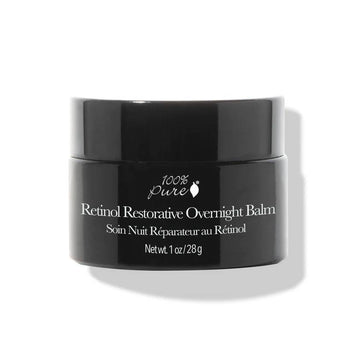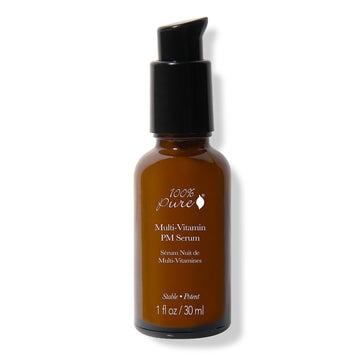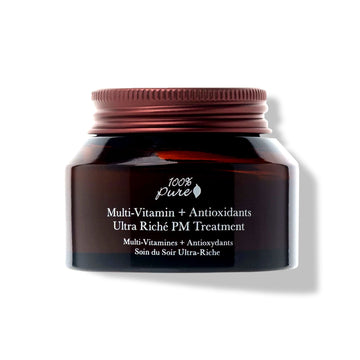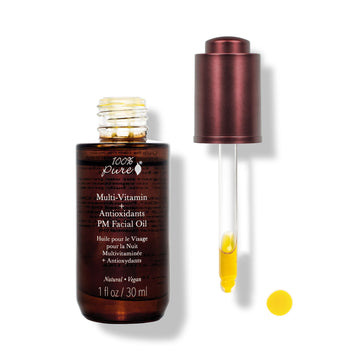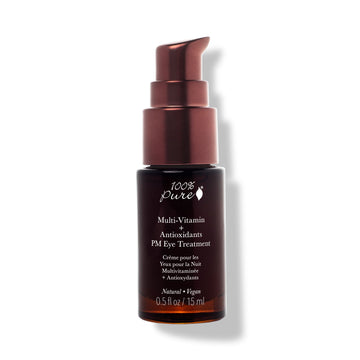What skin does at night, and how your night skincare routine can help
Posted on April 17, 2024 Written by: 100% PURE®
We all know the importance of tailoring our skincare routines to each finicky season. But to do it twice a day? Our skin takes on the brunt of daily environmental stressors, and it’s up to a good night routine to repair it.
It turns out that even when our body is at rest, our skin is busy recovering from a hard day’s work. This makes it essential to have a proper nighttime skincare routine! We’ll review what happens to our skin during the day versus the night, and how your nighttime routine can set you up for the ultimate ‘beauty sleep’.

Have you ever wondered why your morning and nighttime skincare routines aren’t identical? The explanation is simple: our skin has different needs to take on the day versus rest and recoup overnight. You encounter many different daily pollutants that can easily overwhelm the natural reparative functions of your skin.
Environmental stressors from outdoor pollution and UV radiation to free radical damage can (and will) impact the health of your skin over time. Temperature variations like excessive humidity or dry air can also send our skin into a tailspin. Though you may be in an office or at home, skin aggressors like blue light emitted from electronic devices can damage your dermis over time, too.
The big problem with these external skin aggressors is that they can affect what’s near and dear to our hearts – our skin! Lack of radiance, hyperpigmentation, and even garden-variety dry or reactive skin can all be triggered by the elements. Free radicals contribute to premature aging like fine lines and wrinkles, and can wreak havoc on our complexions.
A good night’s sleep does more than thwart the dreaded “you look tired” comment from coworkers. Sleep repairs you. While you’re getting a good snooze, your skin is working at a cellular level to recoup and recover itself for a new day. Your body boosts blood flow to the skin, which means you wake up glowing like a goddess (among other perks)!
This adequate blood flow not only helps you wake up bright-eyed and bushy-tailed but also kicks panda eyes back to the zoo. While you’re getting your beauty sleep, the process of cell mitosis or cell division (that occurs to renew and repair skin) is at its peak. This includes the shedding of dead skin cells and subsequently replacing them with younger cells. Good morning vibrant, rejuvenated skin!
While some skin functions are on the upflow while we sleep, Transepidermal Water Loss (TEWL) increases, and sebum production slows down. Since our immune system is in overdrive working to renew itself (or fighting infections or viruses) your skin’s ability to maintain adequate moisture decreases. This is why your nighttime skin routine is so important.
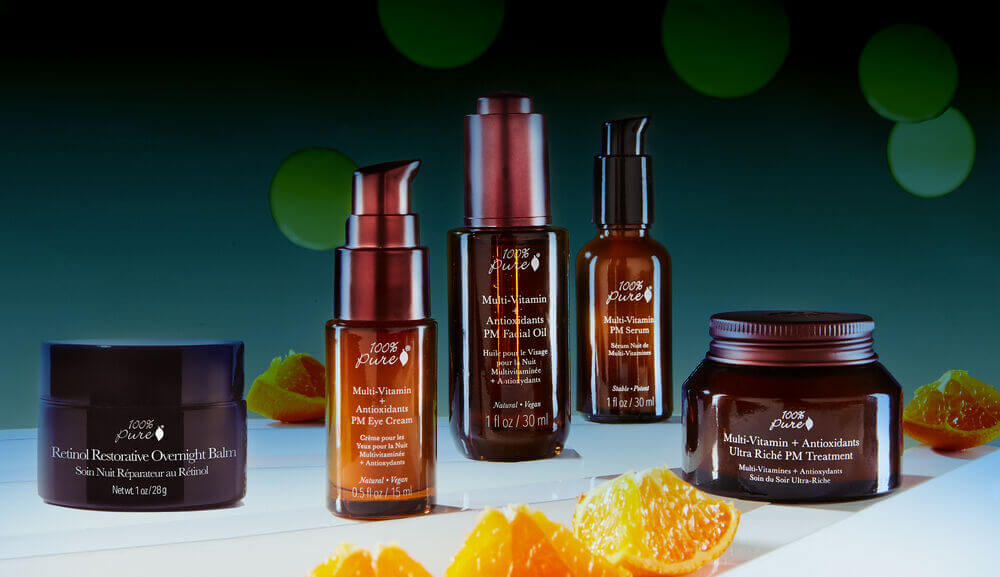
Are you ready for stunning skin in favor of getting more Zzz’s? Floating off to dreamland goes hand in hand with an effective PM skin routine.
During sleep, your skin’s blood flow increases. Your body’s largest organ rebuilds its collagen and repairs damage from UV exposure, helping to combat wrinkles and age spots.
A nightly face balm could be the missing element in your night skincare routine. It’s a necessity for maintaining deep moisture and encouraging visible results. Our Retinol Restorative Overnight Balm is gentle enough to be used most nights of the week and contains soothing jasmine essential oil to tone skin (and usher you into dreamland).
For dry skin, adding the Multi-Vitamin + Antioxidants Potent PM Serum can offer big bedtime benefits for aging skin. It includes hydrating rose water, hyaluronic acid, rosehip oil, and sea buckthorn oil. For extra dry skin, be sure to seal it in with the rich and reparative Multi-Vitamins + Antioxidants Ultra Riche PM Treatment. And if you’re looking to lock in the hydration and nourishment benefits, we encourage the use of a vitamin-packed facial oil, like our Multi-Vitamin + Antioxidants PM Facial Oil.
But with that in mind, don’t forget the eyes! The delicate skin around the eye area benefits from nourishment, which is where our Multi-Vitamin + Antioxidants PM Eye Treatment comes in.
Turns out there is some truth behind the notion of ‘beauty sleep’! By blending a healthy lifestyle with PM skincare and a big dollop of consistent shut-eye, you’re able to give your skin the repair and recovery it needs for a better you. That’s a recipe – and prescription – we’ll take!
What Processes Does the Skin Undergo During the Night?
At night, your skin switches into a mode of recovery and repair. This is due to several physiological changes that occur while you sleep. The blood flow to your skin increases, which means more nutrients and oxygen are delivered to repair the damage from UV exposure and pollution. Cellular regeneration is higher at night, and the skin's barrier has a chance to repair and regenerate itself. This regeneration process is crucial for combating signs of aging and ensuring that the skin remains healthy and resilient.
What Are the Key Differences Between Daytime and Nighttime Skincare Routines?
The main differences between daytime and nighttime skincare routines lie in their objectives and the types of products used:
Daytime routines are primarily focused on protection. They include products with SPF to shield the skin from UV damage, as well as antioxidants to protect against pollution and environmental stressors. Moisturizers used during the day are often lighter and designed to sit well under makeup.
Nighttime routines focus on repair and hydration. They often involve more intensive moisturizers and treatments that support skin regeneration, such as retinol, peptides, and hyaluronic acid. Since there's no concern about sun exposure at night, you can use products that might make your skin more sensitive to the sun, like retinol.
Why Is Moisturization Particularly Important in a Night Skincare Routine?
Moisturization is crucial at night because while you sleep, your skin loses a significant amount of water through evaporation. This process is known as transepidermal water loss (TEWL). Using a good moisturizer can help lock in hydration and strengthen the skin’s barrier function, preventing excessive water loss. A stronger barrier also means your skin is better able to repair itself and fend off irritants. Night creams and moisturizers are typically richer in texture and contain active ingredients that support skin elasticity and repair.
How Can Retinol Contribute to Nighttime Skin Repair?
Retinol, a derivative of vitamin A, is celebrated for its anti-aging and skin-repairing properties. It works by promoting cell turnover and collagen production, which can help reduce the appearance of fine lines, wrinkles, and age spots. Retinol also improves skin texture and tone. Because it accelerates cell renewal, it can make the skin more sensitive to UV radiation, which is why it's recommended for use in the evening. Over time, retinol helps to build a firmer, more youthful skin structure.
What Role Do Peptides Play in Nighttime Skin Recovery?
Peptides are short chains of amino acids that serve as the building blocks of proteins such as collagen, elastin, and keratin. These proteins are essential for the skin’s firmness, elasticity, and strength. Peptides in skincare products can signal your skin to produce more collagen, helping to repair skin damage and reduce the signs of aging. During the night, when your skin is in its repair phase, peptides can enhance the skin's natural regeneration process, leading to improved skin texture and a reduction in wrinkles and fine lines.
Understanding the distinct needs of your skin during the night and selecting products that support its natural repair processes can significantly improve your skin's health and appearance. Nighttime is an opportunity to use potent ingredients that work synergistically with your skin's inherent rhythms, leading to clearer, more youthful-looking skin.
- Tags: April-2024
We carefully hand-select products based on strict purity standards, and only recommend products we feel meet this criteria. 100% PURE™ may earn a small commission for products purchased through affiliate links.
The information in this article is for educational use, and not intended to substitute professional medical advice, diagnosis, or treatment and should not be used as such.













